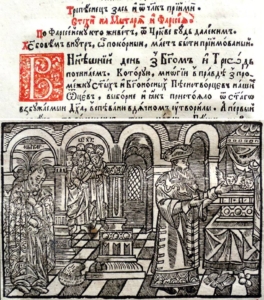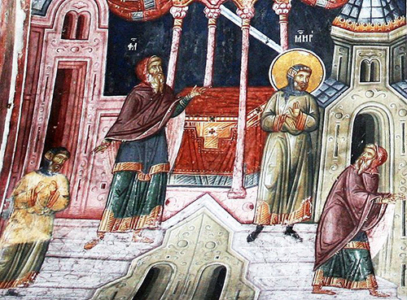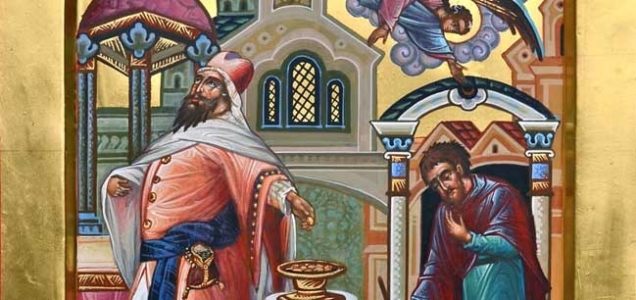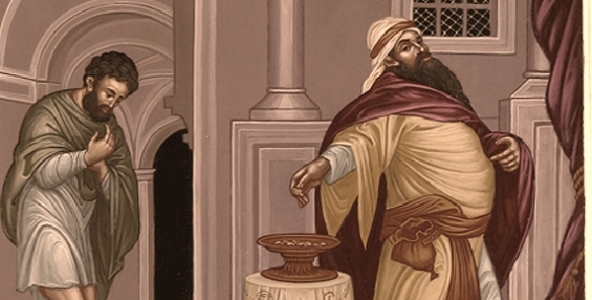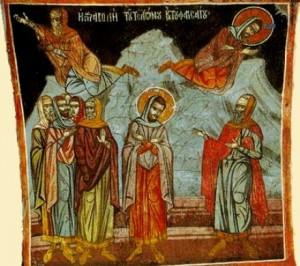
Забележуваме неколку восогласени видa покајно однесување кај митарот: „стоеше оддалеку“, „ни очите да ги подигне“, „се удираше в гради“ и „велеше: ’Боже, биди милостив кон мене, грешниот!‘“ (види: Лука 18, 10–14).
Што мислите, која од овие силни и заемно поврзани пројави на покајание најмногу ја открива неговата духовна состојба? Аскетскиот плач по Бог, поинаку речено, големиот напор да се принуди себеси на плач, односно удирањето в гради. Тоа е истиот или сличен метод што Отците го користеле низ вековите. Тоа е истиот или сличен метод што го препорачува и свети Игнатиј Брјанчанинов во своите дела. И тоа е истиот или сличен метод што и до ден-денес го користат и препорачуваат непосредните и посредните ученици на светиот Старец Јосиф Спилеот и многу други.
Некои велат дека ваквиот начин изгледа соблазнително. Ние би им одговориле, и со збор и со дело: ако Господ Христос не го оценил како соблазнителен и ако Он ни го препорачува, кои сме ние да умуваме вон и над Благата Вест? Севкупниот наш подвиг на степенот на чистење на срцето од страстите, Отците го означиле и го опишале како аскетски – не чувствуваме, а континуирано се принудуваме; немаме отворена поддршка од благодатта, а живееме како да ја имаме!
„Ви велам дека тој си отиде дома повеќе оправдан, отколку оној; зашто секој што се воздига ќе биде унижен, а кој се понизува ќе биде воздигнат.“
Секој што заради гордост и човечка слава се воздига самиот себе и следствено го осудува својот ближен, во истиот момент се унижува, предизвикувајќи отсуство на божествената благодат во себе. А секој што заради заедница со Бог се понизува и осудува самиот себе и следствено го оправдува својот ближен, ја привлекува Божјата несоздадена благодат и во истиот момент бива воздигнат од Бог.
Знајте го уште ова: сите оние на коишто срцето не им е отворено за умно-срдечната молитва треба да знаат дека причината за тоа е осудувањето на ближниот, кое произлегува од нивното високо мислење за самите себе. Односно, произлегува од неправилниот подвиг или, со други зборови, произлегува директно од непослушанието и духовното самораководење.
Со усвојување на мислата „јас сум виновен за сè“ се отвора простор за молитвата на митарот: „Господи Исусе Христе, помилуј ме, грешниот!“ Се раѓа чувството на покајание и плач и, воопшто, текот на мислите е сосема спротивен (самоосудување) од оној што следи после мислата дека другиот е виновен (осудување). Кога во своето срце ја прифаќаме помислата дека другиот е виновен и се согласуваме со неа, покажуваме и дека ни е туѓ подвигот на аскетската љубов. Оној што го љубиме, макар и аскетски, никогаш не е виновен.
Пресвета Богородице, спаси нѐ!
Митрополит Струмички г. Наум
We observe several synchronised types of repentant conduct of the tax collector (publican): “he stood at a distance”, “did not raise his eyes”, “he was beating his chest” saying : ‘God, be merciful to me, a sinner!’
(See: Luke 18, 10-14).
What do you think, which one of these strong and mutually connected manifestations of repentance, best reveals his spiritual condition? The ascetic cry after God, in other words, the great effort to force himself to cry, that is, the beating of his chest.
It is the same or similar method that the Holy Fathers used throughout the centuries. It is the same or similar method that is recommended by saint Ignatij Brjanchaninov in his works.
And it is the same or similar method that to this day is used and recommended by the direct and indirect students of the Holy Elder Joseph Spileot and many others.
Some people say that this way seems repellent (tempting). We would answer them, both by word and by deed: if the Lord Jesus Christ did not judge this method as tempting and if He recommends it to us, who are we to philosophise out and above the Good News?
The whole our struggle on the level of the purification of the heart from the passions, the Holy Fathers signified and described as ascetic – we do not feel, and we are continually forcing ourselves; we have no open support of the grace, but we live as if we had it!
“I can tell you that he went home more justified than the other one; for everyone who exalts himself will be humbled, and whoever is humble will be exalted. ”
Anyone who, for the sake of pride and human glory, exalts himself and consequently condemns his neighbour, at the same moment humiliates himself, causing absence of the Divine Grace within himself.
And anyone who for the sake of communion with God, humbles and condemns himself and consequently justifies his fellowman, attracts God’s uncreated grace and at the same time is exalted by God.
May you know this: all those whose heart is not open for the Jesus ceaseless prayer (prayer of the mind in the heart) should know that the reason for this is the condemnation of our fellowmen, which comes out from their high opinion of themselves. That is, it arises from an improper struggle, in other words, comes out directly from disobedience and spiritual self-management.
By adopting the thought “I am to blame for everything”, a space opens in the heart for the prayer of the publican:
“Lord Jesus Christ, have mercy on me, a sinner!”
The feeling of repentance and mourning is born and, in general, the course of the thoughts is completely opposite (self-judgment) than the one following the thought that the other one is guilty (condemnation).
When in our heart we accept the thought that the other one is guilty and agree with it, we also show that the struggle of the ascetic love is strange to us.
The one we love, even in ascetic way, is never guilty.
Holy Mother of God, save us!
Metropolitan Nahum of Strumica

